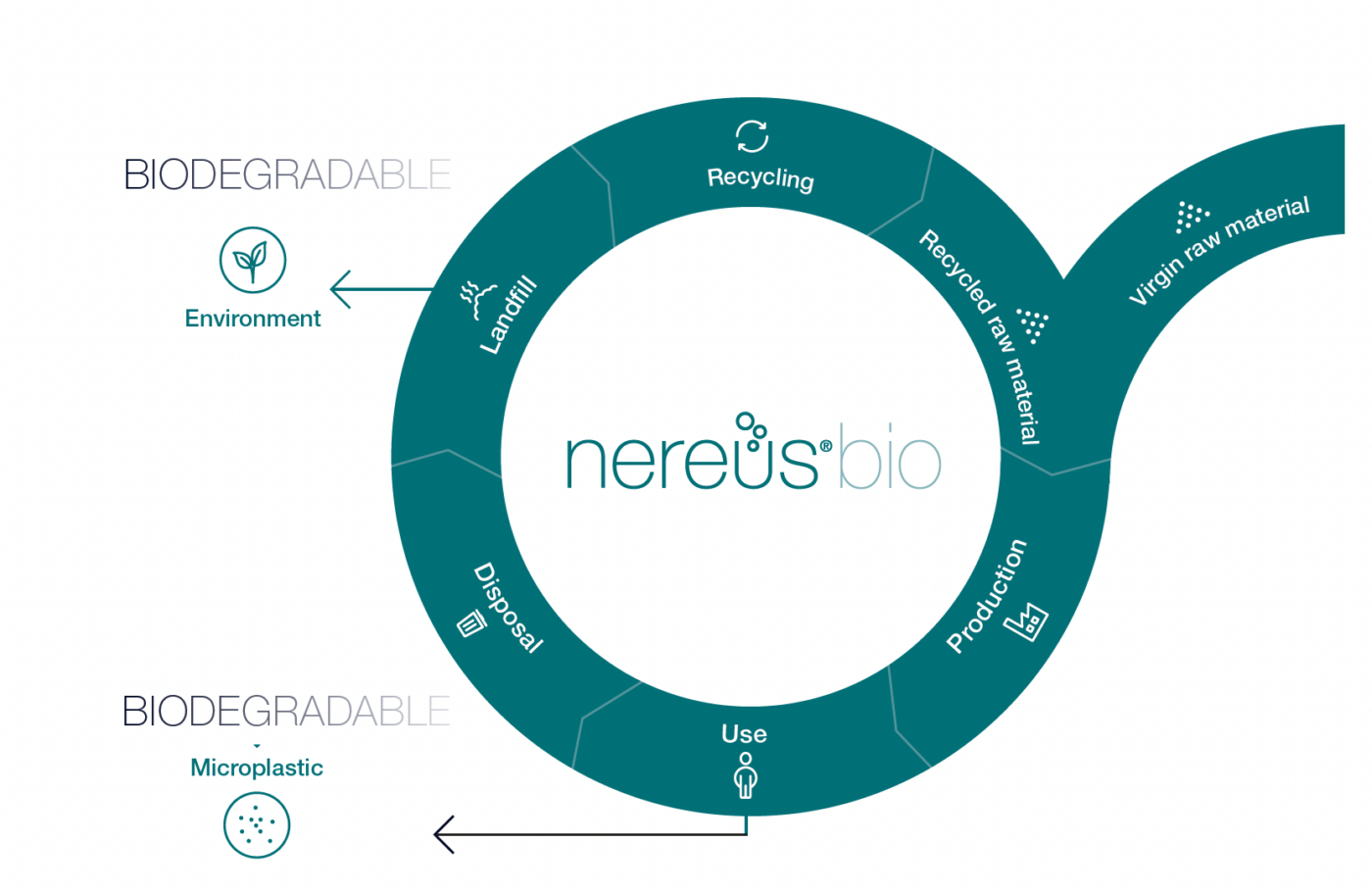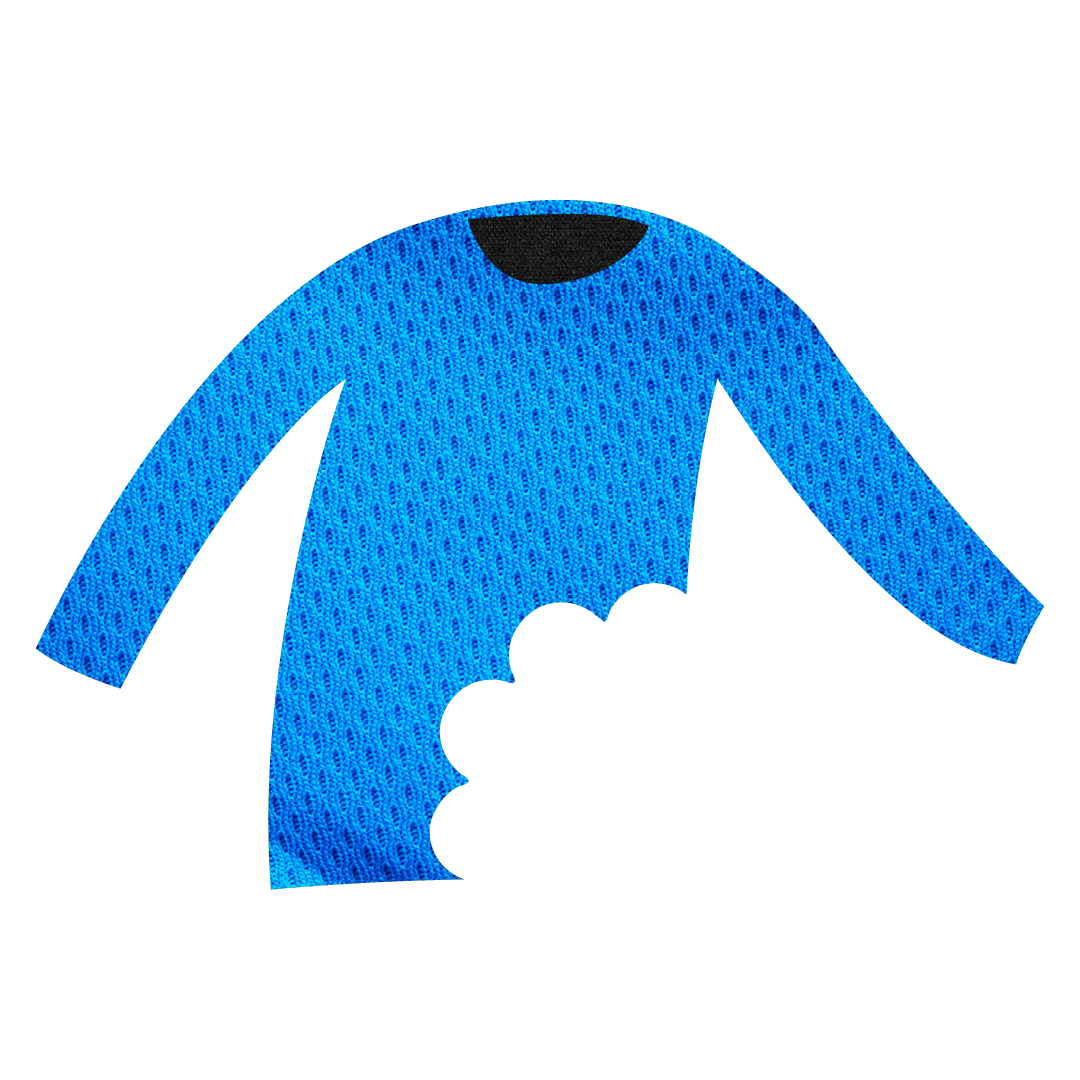Engineered to return to nature.
By returning to materials found in nature, Nereus® Bio helps reduce the long-term environmental impact of microplastics in oceans, landfills and waterways.
Many commonly used products – including outerwear, bedding, and wipes – are made from synthetic materials that can release microfibers. This release happens during everyday use, regular washing, and at the end of the product’s life. These microfibers often find their way into natural environments such as rivers, oceans, and landfills.
Fibers like those used in Nereus Bio have been designed to break down more naturally over time, helping to limit the persistence of microfibers in these environments across the product’s full life cycle.


Let’s make microplastic a micro problem
When left in active microbial environments such as landfill or ocean water, Nereus® Bio will hydrolyze and biodegrade. This efficiently minimize micro plastic pollution, unlike OXO or UV degradation that creates micoplastics in the presence of oxygen and sunlight and does not biodegrade.
- Reduces the long-term impact of microplastic pollution
- Resistant to the UV and OXO degradation
- Tested in landfill, ocean water, soil and wastewater conditions
- Scientifically tested and proven effect
- Does not impact normal usage
Performance.
With Nereus® Bio, performance and comfort remain uncompromised. The fibers are engineered to deliver the same high standard of insulation and durability throughout a product’s use — while introducing new ways to handle end-of-life impact.
Nereus® Bio offers an approach that considers the entire life cycle of a product, from production and use to disposal.


How does it work?
Nereus® Bio fibers are made to break down more rapidly in environments like landfills, oceans, and wastewater, where specific microbes are present. The fiber structure has been tailored to be more accessible to these naturally occurring microorganisms.
What’s left.
These microbes enable synthetic insulation and fabric to return to materials found in nature, leaving behind components like water, CO2, methane, biomass and humus – a common, natural component of potting soil.
Please contact us if you want to know more about Nereus® Bio
FAQ
Can Nereus® Bio be recycled?
Yes, Nereus® Bio can be chemically recycled and fits perfectly in a circular lifespan, and Nereus® Bio maintain a 95% yield rate through the chemical recycling process.
How does Nereus® Bio work with EU’s single-use plastic directive?
Polyester is a polymer, and therefore the end product could be considered as a “plastic”. This means that different measures from Single-Use Plastic Directive can be applied to your product.
Will Nereus® Bio biodegrade during usage?
Again, it’s a no. Nereus® Bio fibers in products do not biodegrade during usage. Only microplastics that leave products ending up in landfills or oceans will biodegrade, so there really is no special care required.
Does Nereus® Bio require a change in production set-up?
No, Nereus® Bio has the same characteristics and performance as regular PET fibers with the same output and same whiteness, and it blends well with natural fibers.
Will Nereus® Bio biodegrade on shelves?
No, Nereus® Bio only biodegrades in environments with naturally occurring microbes, such as landfills, oceans, and wastewater. Nereus® Bio comes in normal bales and has a normal shelf life with no need for special care or treatment during storage and transportation.
Can Nereus® Bio be used for my products?
Nereus® Bio can be added to any type of polyester and fabric fiber, from wadding, filtration, and automotive to acoustics, medical, and hygiene products.
How can we be sure it works on our set-up?
Before initiating full production, a sample is sent to 3rd party lab for an accelerated test that measures the initial behavior of the fiber. After the QC test for up to 90 days, we can verify that the technology works, and the staple fibers are approved.
Is Nereus® Bio available today?
YES! Nereus® Bio is already available from several locations worldwide, both virgin and recycled from a controlled supply chain. There is full capacity and delivery guarantee. And that’s why we can start fixing polyester right now.
Is Nereus® Bio scalable?
Yes, we are already commercial with BICO (low melting fibers), solid, and hollow fibers – and have no capacity issues.
How does Nereus® Bio work?
Polyester is a complex molecule that naturally occuring microbes have a hard time digesting, why standard polyester does not biodegrade. Nereus® Bio optimizes the polyester or fabric fiber with a simple sugar, making the fibers easier and more pleasant for microbes to digest. Essentially, we make your fiber a Boston Cream Donut for microbes.
